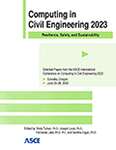A Comparative Study of Human-Centered HVAC System Energy Optimization for Demand Response
Publication: Computing in Civil Engineering 2023
ABSTRACT
The effective control of heating, ventilation, and air conditioning (HVAC) systems can reduce peak energy demand and balance energy usage throughout the day. Co-optimizing energy cost and comfort is one of the main paradigms in HVAC systems’ control. This paper presents a feasibility study of a human-centered co-optimization-based controller. Two methods were utilized to factor in comfort in optimization formulations including deviation from a temperature setpoint and the integration of personalized thermal comfort models. We compared the effectiveness of these two approaches in achieving comfort during peak times by hypothesizing that the integration of personalized comfort measures will result in an improved comfort experience for users during demand response. The controllers’ performance was evaluated using a simulated benchmark small office and various combinations of comfort profiles for single occupancy scenarios. Our results indicate that integrating personalized comfort profiles into an optimization-based controller has the potential to improve users’ comfort experience by considerably decreasing the variance of comfort experience compared to the conventional controller.
Get full access to this article
View all available purchase options and get full access to this chapter.
REFERENCES
Alimohammadisagvand, B., Jokisalo, J., and Sirén, K. (2018). “Comparison of four rule-based demand response control algorithms in an electrically and heat pump-heated residential building.” Applied Energy, 209, 167–179.
Amin, U., Hossain, M. J., and Fernandez, E. (2020). “Optimal price based control of HVAC systems in multizone office buildings for demand response.” Journal of Cleaner Production, 270.
Chen, B., Cai, Z., and Bergés, M. (2020). “Gnu-RL: A Practical and Scalable Reinforcement Learning Solution for Building HVAC Control Using a Differentiable MPC Policy.” Frontiers in Built Environment, 6.
Cheung, T., Schiavon, S., Parkinson, T., Li, P., and Brager, G. (2019). “Analysis of the accuracy on PMV – PPD model using the ASHRAE Global Thermal Comfort Database II.” Building and Environment, 153, 205–217.
Ghahramani, A., Jazizadeh, F., and Becerik-Gerber, B. (2014). “A knowledge based approach for selecting energy-aware and comfort-driven HVAC temperature set points.” Energy and Buildings, 85, 536–548.
Jazizadeh, F., Ghahramani, A., Becerik-Gerber, B., Kichkaylo, T., and Orosz, M. (2013). “Human-Building Interaction Framework for Personalized Thermal Comfort-Driven Systems in Office Buildings.” Journal of Computing in Civil Engineering.
Jazizadeh, F., Ghahramani, A., Becerik-Gerber, B., Kichkaylo, T., and Orosz, M. (2014). “Human-Building Interaction Framework for Personalized Thermal Comfort-Driven Systems in Office Buildings.” Journal of Computing in Civil Engineering, 28(1), 2–16.
Jung, W., and Jazizadeh, F. (2019). “Comparative assessment of HVAC control strategies using personal thermal comfort and sensitivity models.” Building and Environment, 158, 104–119.
Jung, W., and Jazizadeh, F. (2020). “Energy saving potentials of integrating personal thermal comfort models for control of building systems: Comprehensive quantification through combinatorial consideration of influential parameters.” Applied Energy, 268.
Kim, Y.-J. (2018). “Optimal Price Based Demand Response of HVAC Systems in Multizone Office Buildings Considering Thermal Preferences of Individual Occupants Buildings.” IEEE Transactions on Industrial Informatics, 14(11), 5060–5073.
Ostadijafari, M., Dubey, A., and Yu, N. (2020). “Linearized Price-Responsive HVAC Controller for Optimal Scheduling of Smart Building Loads.” IEEE Transactions on Smart Grid, 11(4), 3131–3145.
PNNL. (2021). “Prototype Building Models.” <https://www.energycodes.gov/prototype-building-models#Commercial>.
Yu, L., Sun, Y., Xu, Z., Shen, C., Yue, D., Jiang, T., and Guan, X. (2021). “Multi-Agent Deep Reinforcement Learning for HVAC Control in Commercial Buildings.” IEEE Transactions on Smart Grid, 12(1), 407–419.
Information & Authors
Information
Published In
History
Published online: Jan 25, 2024
ASCE Technical Topics:
- Architectural engineering
- Building systems
- Business management
- Comparative studies
- Electric power
- Energy engineering
- Energy infrastructure
- Engineering fundamentals
- Engineering mechanics
- Feasibility studies
- Human and behavioral factors
- HVAC
- Infrastructure
- Lifeline systems
- Methodology (by type)
- Models (by type)
- Optimization models
- Power demand
- Practice and Profession
- Research methods (by type)
- Thermal analysis
- Thermodynamics
Authors
Metrics & Citations
Metrics
Citations
Download citation
If you have the appropriate software installed, you can download article citation data to the citation manager of your choice. Simply select your manager software from the list below and click Download.
